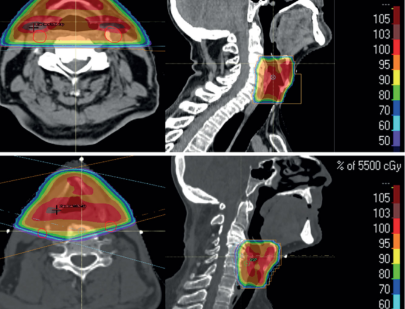Phone : +918802081838

Throat Cancer or Pharyngeal and Laryngeal Cancer

Throat cancer, also known as pharyngeal or laryngeal cancer, affects the tissues of the throat, including the pharynx and larynx (voice box). It is primarily linked to tobacco and alcohol use, and certain strains of HPV can also increase risk, particularly in the oropharynx. Symptoms often include persistent hoarseness, difficulty swallowing, and sore throat. Early diagnosis through laryngoscopy and biopsy is crucial for successful treatment, which may involve surgery, radiation therapy, and chemotherapy. Regular screenings and lifestyle changes, such as quitting smoking, can significantly reduce the risk of throat cancer.
Prevention of Throat and Laryngeal Cancer
Preventing throat and laryngeal cancer starts with eliminating risk factors. Quitting tobacco and alcohol significantly reduces cancer risks, as these are major contributors. HPV vaccination can prevent cancer linked to the virus, particularly those in the oropharynx. A healthy diet rich in fruits and vegetables also provides essential nutrients that can reduce cancer risks. Regular medical checkups and screenings are important, especially for those with a family history or high-risk factors, ensuring any early signs are promptly addressed.
Prognosis and Survival Rates
The prognosis for throat and laryngeal cancer depends heavily on early detection. When diagnosed early, the 5-year survival rate for localized cancer can be quite high, often around 60-80%. As the cancer advances, survival rates decrease, making a timely diagnosis crucial. Modern treatments like radiation therapy and targeted therapies offer improved outcomes for patients with advanced cancer. Ongoing advancements in cancer treatment continue to enhance survival prospects, even for more complex cases.
Major Risk Factors for Throat Cancer
Tobacco, alcohol, and other key contributors
- Tobacco Use: Smoking or chewing increases throat cancer
- Excessive Alcohol Consumption: Heavy alcohol use heightens the risk
- HPV Infection: Certain HPV strains are linked to throat cancer
- Poor Nutrition: Lack of essential vitamins and nutrients
- Chronic Acid Reflux: Long-term GERD may contribute to throat cancer development
Common Symptoms of Throat Cancer
Key warning signs to look for
- Hoarseness: Persistent voice changes or hoarseness lasting weeks
- Sore Throat: Continuous throat pain without improvement
- Difficulty Swallowing: Pain or discomfort when eating or drinking
- Lump in Neck: Unexplained lump or swelling in the neck area
- Ear Pain: Ongoing pain in the ear, especially on one side
Effective Treatment Options for Pharyngeal/Laryngeal Cancer
Modern approaches to managing and treating cancer
- Surgery: Removal of tumors or affected tissues
- Radiation Therapy: High-energy rays targeting cancer cells
- Chemotherapy: Drugs used to kill or slow cancer growth
- Targeted Therapy: Focuses on specific cancer cell mechanisms
- Immunotherapy: Boosts the body’s immune system to fight cancer

Dr. Khyati Bhatia Grover.All Rights Reserved © 2025






